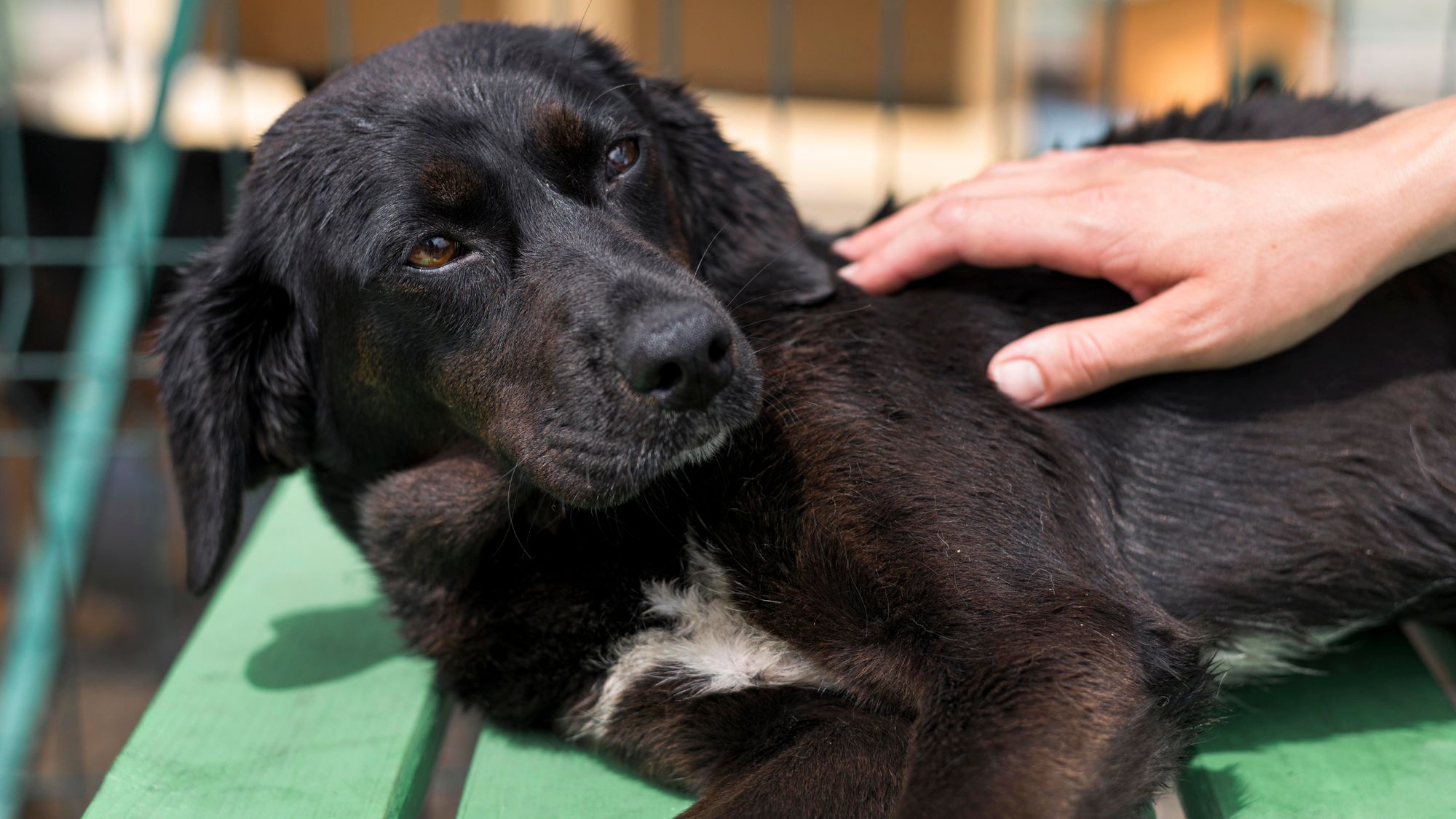If you've noticed your furry friend constantly scratching, licking, or experiencing recurrent ear infections, it can be distressing for both you and your dog. The sight of your beloved pet in discomfort may lead you to consider allergies as a potential cause. This article aims to provide an extensive understanding of dog allergy testing, offering insights and solutions to help pet owners comprehend and address this common issue.
Understanding Allergies in Dogs
Before delving into the specifics of dog allergy testing, let's gain a comprehensive understanding of what allergies are and how they affect our four-legged companions. Just like humans, dogs can develop allergies to various substances, and these allergies can manifest in different ways. Allergens, which are substances that trigger allergies, can include pollen, dust mites, mold, certain foods, and even fleas.

Common Allergy Symptoms in Dogs
Recognizing the symptoms of allergies in dogs is crucial for early intervention. Look out for the following signs:
- Itchy Skin: Dogs with allergies often exhibit excessive scratching, leading to irritated, red, or inflamed skin.
- Ear Infections: Allergies can cause ear inflammation and recurrent infections, resulting in head shaking and discomfort.
- Digestive Issues: Food allergies can lead to vomiting, diarrhea, or excessive gas.
- Respiratory Problems: Allergic reactions can affect a dog's respiratory system, causing coughing, sneezing, and wheezing.
- Lethargy: Dogs suffering from allergies may become lethargic and lose interest in activities.
The Significance of Dog Allergy Testing
When you suspect that your dog is suffering from allergies, it's essential to determine the specific allergens causing these reactions. Dog allergy testing is the key to pinpointing these triggers and developing an effective treatment plan.
Types of Dog Allergy Tests
Several methods are available for testing allergies in dogs, each with its own set of advantages and drawbacks. Here are the most common types:
1. Skin Prick Test
- This test involves introducing small amounts of suspected allergens into your dog's skin through tiny pricks. Subsequently, the veterinarian observes the reactions to identify allergens.
- While this test is relatively quick and cost-effective, it may require sedation for anxious dogs.
2. Blood Test
- A blood test measures the levels of antibodies, particularly immunoglobulin E (IgE), in your dog's blood in response to specific allergens.
- It's a less invasive option than the skin prick test and is suitable for dogs with skin conditions or those unable to undergo the skin test.
3. Elimination Diet
- In cases of suspected food allergies, an elimination diet can help identify problematic ingredients. Your dog is placed on a novel protein diet, and ingredients are gradually reintroduced one by one to monitor reactions.
- While this method can be time-consuming, it is highly effective in identifying food allergens.
Consult Your Veterinarian
Before proceeding with any allergy testing, it is crucial to consult your veterinarian. They will provide guidance on selecting the most appropriate test based on your dog's symptoms and medical history.
Understanding Allergy Test Results
After completing allergy testing, interpreting the results is the next step. Your veterinarian will assist you in comprehending the findings and devising a tailored treatment plan.
Identifying Allergens
The test results will highlight the specific allergens responsible for triggering your dog's reactions. These may include pollen, dust mites, certain foods, or other environmental factors.
Assessing Allergy Severity
The tests will also offer insights into the severity of your dog's allergies. While some dogs may exhibit mild reactions, others may suffer from severe and potentially life-threatening allergies.
Allergy Treatment Options
Once allergens and their severity have been identified, you and your veterinarian can discuss the best course of action. Treatment options for dog allergies may include:
Allergen Avoidance
For environmental allergens like pollen and dust mites, minimizing exposure is often the initial step in managing allergies. This involves maintaining a clean home, employing air purifiers, and avoiding allergen-rich environments.
Medications
In cases where allergen avoidance proves insufficient, your veterinarian may prescribe medications such as antihistamines, corticosteroids, or immune-modulating drugs to alleviate symptoms.
Immunotherapy
Immunotherapy, commonly known as allergy shots, can be effective for dogs with severe allergies. It entails administering controlled doses of allergens to help your dog build immunity over time.
Special Diets
If food allergies are the culprit, your veterinarian may recommend a special hypoallergenic diet that excludes common allergenic ingredients.
Topical Treatments
Dogs with skin allergies can benefit from topical treatments such as medicated shampoos or creams to soothe irritated skin.
Long-Term Allergy Management
Managing your dog's allergies is an ongoing process that requires dedication, diligence, and collaboration with your veterinarian. Here are some tips for long-term allergy management:
- Regular Check-Ups: Schedule periodic check-ups with your vet to monitor your dog's progress and make necessary adjustments to the treatment plan.
- Creating an Allergen-Free Environment: Establish an allergen-free environment at home by maintaining cleanliness, utilizing air purifiers, and washing your dog's bedding regularly.
- Medication Adherence: If your dog is prescribed medication, be sure to administer it as directed and closely follow your vet's instructions.
- Dietary Management: For dogs with food allergies, strictly adhere to the recommended diet and avoid feeding your dog any known allergens.
- Allergy Awareness: Educate yourself about common allergens and their sources to minimize your dog's exposure.

Allergen Exposure Management
After identifying the specific allergens that affect your dog, you can take proactive steps to minimize their exposure. This plays a crucial role in preventing allergy flare-ups and maintaining your pet's comfort.
- Environmental Allergens: If your dog is allergic to environmental factors like pollen, dust mites, or mold, consider making changes to your home environment. Regular cleaning, using allergen-proof covers on bedding, and investing in high-quality air purifiers can significantly reduce allergen levels in your home.
- Flea Control: Flea allergies are common among dogs. Regular flea prevention measures, such as topical treatments or flea collars recommended by your veterinarian, can help prevent allergic reactions triggered by these pesky parasites.
- Food Allergies: Managing food allergies necessitates strict adherence to a prescribed diet. Avoid feeding your dog anything that contains allergenic ingredients, and be vigilant about cross-contamination in your home.
Adjusting Treatment Plans
Allergy management is not a one-size-fits-all approach. Over time, your dog's needs may change, and their response to treatment may vary. Regular follow-up appointments with your veterinarian are essential for evaluating the effectiveness of the chosen treatment plan.
- Medication Updates: If your dog is on medication, your vet may need to adjust the dosage or switch medications if they notice any side effects or changes in your pet's condition.
- Immunotherapy Progress: For dogs undergoing immunotherapy, regular check-ins are vital to monitor progress and determine if adjustments to the treatment regimen are necessary.
- Dietary Tweaks: If your dog has food allergies and you've been following a special diet, your vet may recommend occasional dietary adjustments to ensure your dog receives balanced nutrition.
Patience and Consistency
Managing dog allergies can be challenging, and it requires patience and consistency. It's important to remember that while treatments can help alleviate symptoms, they may not provide an instant cure. Be prepared for ups and downs along the way.
- Monitoring for Relapses: Even with effective management, your dog may experience occasional relapses. These can be triggered by changes in allergen exposure or other factors. Promptly address any flare-ups with the guidance of your veterinarian.
- Stress Reduction: Stress can exacerbate allergy symptoms in dogs. Create a calm and stable environment for your pet, and provide plenty of love and attention to reduce stress-related reactions.
- Positive Reinforcement: Reward your dog for cooperating during treatments or when they exhibit good behavior during allergy flare-ups. Positive reinforcement can make the process more manageable for both of you.
Staying Informed
As a responsible dog owner, staying informed about the latest developments in allergy management is essential. New treatments and approaches may emerge that can further improve your dog's quality of life.
- Join Support Groups: Online forums and social media groups dedicated to pet allergies can provide a sense of community and a platform for sharing experiences and tips.
- Continuing Education: Attend seminars or workshops on pet allergies to gain a deeper understanding of the latest research and treatment options.
Holistic Approaches to Allergy Management
In addition to conventional medical treatments, some pet owners explore holistic approaches to alleviate their dog's allergy symptoms. While these methods may not replace medical interventions, they can complement traditional treatments:
- Dietary Supplements: Some supplements, such as omega-3 fatty acids and probiotics, may help support your dog's immune system and improve skin health. Always consult your veterinarian before adding supplements to your dog's diet.
- Herbal Remedies: Certain herbs like chamomile and calendula are known for their anti-inflammatory and soothing properties. Herbal remedies can be used in conjunction with other treatments, but it's crucial to consult with a holistic veterinarian to ensure safe usage.
- Acupuncture and Chiropractic Care: Some pet owners opt for acupuncture or chiropractic care to help relieve discomfort and improve their dog's overall well-being. These alternative therapies should be administered by qualified professionals.

Allergy Management During Seasonal Changes
Many dogs with environmental allergies experience worsened symptoms during specific seasons when allergen levels are higher. To mitigate the impact of seasonal changes on your dog's allergies:
- Stay Informed: Be aware of when the allergens that affect your dog are most prevalent. This knowledge can help you prepare for potential flare-ups.
- Implement Preventative Measures: Prioritize allergen avoidance strategies during peak allergy seasons. For example, if pollen is a trigger, limit outdoor activities during high pollen count days.
- Medication Adjustments: Consult your veterinarian about potentially adjusting medication dosages or treatments during allergy seasons to provide extra relief.
Supportive Care and Comfort
Your dog's comfort and well-being should always be a top priority, especially when they are experiencing allergy-related discomfort:
- Regular Baths: Giving your dog regular baths with a hypoallergenic shampoo can help remove allergens from their skin and coat. Be sure to use a product recommended by your veterinarian.
- Cool Compresses: Applying cool, damp compresses to itchy areas can provide immediate relief and soothe irritated skin.
- Soft, Comfortable Bedding: Ensure your dog has a comfortable and clean bed to rest on. Avoid materials that could trap allergens, such as heavy drapery or carpeting.
Continual Communication with Your Veterinarian
Maintaining an open line of communication with your veterinarian is vital throughout your dog's allergy management journey:
- Updates and Progress Reports: Regularly inform your veterinarian about any changes in your dog's condition, even subtle ones. This allows them to make necessary adjustments to the treatment plan.
- Emergency Preparedness: Discuss an emergency plan with your veterinarian in case your dog experiences a severe allergic reaction. Knowing what to do in such situations can be lifesaving.
- Ask Questions: Don't hesitate to ask your veterinarian any questions or seek clarification on aspects of your dog's treatment or condition that you may not fully understand.
Finding Support and Community
Caring for a dog with allergies can be emotionally challenging. Finding support from fellow pet owners who are going through similar experiences can be invaluable:
- Online Forums and Communities: Joining online forums or social media groups dedicated to pet allergies can provide a sense of camaraderie. These platforms offer a space to ask questions, share insights, and offer support to others in similar situations.
- Local Support Groups: Some areas have local support groups for pet owners dealing with allergies in their dogs. Check with your veterinarian or local animal organizations for information on such groups in your area.
Preparing for Travel and New Environments
If you're planning to travel with your dog or move to a new location, it's crucial to consider how this change may impact their allergies:
- Research Destination: If you're moving to a new area, research the local allergens and environmental factors that could affect your dog. Knowing the potential triggers will help you prepare appropriately.
- Travel Precautions: When traveling with your dog, ensure you have all necessary medications, allergy-specific supplies, and any dietary requirements they may need. Consult your veterinarian for advice on managing allergies during travel.
- Allergen-Free Accommodations: When booking accommodations, consider pet-friendly options that are also allergen-free. Clean and allergen-controlled environments can make a significant difference in your dog's comfort.
Maintaining a Balanced Diet
A well-balanced diet is essential for your dog's overall health and can play a crucial role in managing food allergies:
- Consult Your Veterinarian: Work closely with your veterinarian to determine the most suitable diet for your dog, especially if they have food allergies. Your vet may recommend hypoallergenic or limited-ingredient diets.
- Avoid Unsupervised Feeding: Refrain from allowing your dog to scavenge for food or feed them table scraps, as this can lead to accidental allergen exposure.
- Regular Monitoring: Keep a vigilant eye on your dog's diet and monitor for any signs of digestive issues or allergic reactions. Promptly report any concerns to your veterinarian.
Allergy Testing Updates
Over time, it's beneficial to revisit allergy testing and reevaluate your dog's specific sensitivities:
- Testing as Needed: Depending on the type and severity of your dog's allergies, consult with your veterinarian about the necessity of retesting. Allergies can evolve or change over time.
- Identifying New Triggers: Be aware that new allergens could emerge in your dog's environment. Regular testing helps identify any new triggers that may affect their health.
Promoting Overall Wellness
Optimal wellness contributes to your dog's ability to cope with allergies effectively. Maintain good general care practices:
- Regular Exercise: Keep your dog active to promote a healthy immune system and reduce stress, which can exacerbate allergies.
- Routine Grooming: Regular grooming, including brushing and keeping their coat clean, can help reduce the buildup of allergens on their fur and skin.
- Quality Sleep: Ensure your dog gets sufficient rest. A well-rested dog is better equipped to handle allergens and stress.
Conclusion:
In conclusion, managing your dog's allergies is a lifelong commitment that involves proactive measures, open communication with your veterinarian, and unwavering dedication to your pet's well-being. Whether addressing dietary needs, environmental allergens, or seeking holistic approaches, your dog's comfort remains paramount.
As you navigate seasonal changes, travel, and potential dietary adjustments, remember that optimal wellness promotes better allergy management. Stay informed, engage with supportive communities, and regularly consult your veterinarian for updates on allergy testing and treatment plans. Your efforts, combined with love and patience, ensure your cherished canine companion enjoys a happy, allergy-free life for years to come.
FAQs
- What are the common signs of allergies in dogs?
- Common signs of allergies in dogs include itchy skin, recurrent ear infections, digestive issues, respiratory problems, and lethargy. Identifying these symptoms is crucial for early intervention.
- How can I determine if my dog has allergies?
- To determine if your dog has allergies, consult with a veterinarian who can recommend allergy testing. Common tests include skin prick tests, blood tests, and elimination diets for food allergies.
- What treatment options are available for dog allergies?
- Treatment options for dog allergies include allergen avoidance, medications (such as antihistamines and corticosteroids), immunotherapy (allergy shots), special diets for food allergies, and topical treatments for skin allergies.
- How can I manage my dog's allergies during seasonal changes?
- To manage allergies during seasonal changes, stay informed about prevalent allergens in your area, implement allergen avoidance strategies, and consult your veterinarian about potential medication adjustments.
- What can I do to support my dog's comfort and well-being during allergy flare-ups?
- Supporting your dog during allergy flare-ups involves providing regular baths with hypoallergenic shampoo, using cool compresses for relief, and ensuring comfortable bedding. Consult with your vet for specific guidance.
- Are there holistic approaches to managing dog allergies?
- Yes, some holistic approaches include dietary supplements, herbal remedies, acupuncture, and chiropractic care. Always consult with a holistic veterinarian for safe usage.
- Should I continue allergy management if I'm planning to travel or move to a new location?
- Yes, it's important to consider how changes in location may affect your dog's allergies. Research allergens in the new area, prepare for travel with necessary supplies, and maintain your dog's allergy management routine.
- How often should I revisit allergy testing for my dog?
- The frequency of allergy testing depends on your dog's specific allergies and their response to treatment. Consult with your veterinarian to determine when retesting is necessary.
- What role does a balanced diet play in managing dog allergies?
- A well-balanced diet is essential for dogs with food allergies. Consult your veterinarian for guidance on hypoallergenic or limited-ingredient diets and avoid unsupervised feeding to prevent allergen exposure.
- How can I promote overall wellness for my dog while managing allergies?
- Promoting overall wellness involves regular exercise, routine grooming, ensuring quality sleep, and maintaining open communication with your veterinarian for holistic care.




